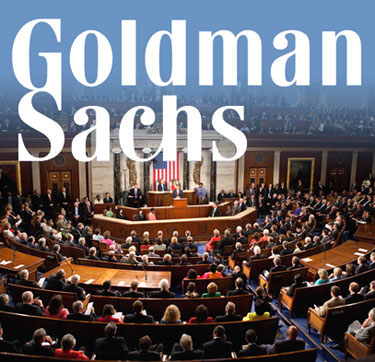Kurt Nimmo
Infowars.com
November 17, 2010
Infowars.com
November 17, 2010
Now that the game of political musical chairs is over and Republicans will control the House next year, the banksters are busy at work whittling away at provisions contained in the financial regulation bill pushed through Congress earlier this year by the Democrats. As should be expected, the corporate media is mostly mum, although McClatchy ran with a story.
 | |
| Goldman and the bankers let Congress know who is in charge. | |
“Lobbyists for Big Finance are working hardest to neutralize the so-called Volcker Rule, which would force big banks to spin off their lucrative proprietary trading operations, in which they invest their own capital in speculative deals,” Kevin G. Hall writes for McClatchy Newspapers.
The measure is named after former Fed mob boss Paul Volcker. It prevents the banksters from betting against trades they made on behalf of their customers, a popular practice until the fuse was lit on the global economy beginning in 2008. Goldman Sachs sold customers overvalued mortgage bonds and then turned around and made secret bets those bonds would default.
Lobbyists are crawling all over the district of criminals like blood thirsty ticks on a swamp dog. They are working to “soften” requirements that Wall Street firms put more “skin in the game” by retaining more mortgage bonds on their books to guard against shoddy lending. They’re also trying to undercut the new Consumer Financial Protection Bureau, according to McClatchy.
Bailout watcher Elizabeth Warren said the Financial Protection Bureau is the strongest financial reform in Obama’s bill. However, considering the bureau’s proposed makeup, it is destined to rolled in like a Trojan horse. “The bureau will consolidate employees and responsibilities from a host of other regulatory bodies, including the Federal Reserve, the Federal Trade Commission, the Federal Deposit Insurance Corporation and even the Department of Housing and Urban Development,” the New York Times reported in September.
The Federal Reserve was established by private bankers — banks and associated businesses owned by the Rockfellers, J.P. Morgan, the Rothschilds, Lazard Freres, Schoellkopf, Kuhn-Loeb, the Warburgs, Lehman Brothers and Goldman Sachs — and exists solely to manipulate and control the nation’s money supply.
Goldman Sachs was a top Obama contributor along with Citigroup, JP Morgan Chase and Morgan Stanley. “Goldman’s connections to the White House and the Obama administration are raising eyebrows at a time when Washington and Wall Street are dueling over how to overhaul regulation of the financial world,” McClatchy reported in April. “Several former Goldman executives hold senior positions in the Obama administration, including Gary Gensler, the chairman of the Commodity Futures Trading Commission; Mark Patterson, a former Goldman lobbyist who is chief of staff to Treasury Secretary Timothy Geithner; and Robert Hormats, the undersecretary of state for economic, energy and agricultural affairs.”
From the very start, the Barry Obama administration was stacked like a crooked card deck withbankster insiders. Out of 14 top cabinet selections, 9 are affiliated with the Bilderberg group, 10 with the Council on Foreign Relations and 5 of are affiliated with the Trilateral Commission.
Now that the mid-term election is safely behind us, the elite plan to dump aspects of the so-called financial reform bill — like protecting consumers from loan sharks and shady investment hucksters — and continue their plan to slow motion implode the economy and take blindsided tax payers to the proverbial cleaners.
Fresh food that lasts from eFoods Direct (Ad)
Live Superfoods
Print this page


